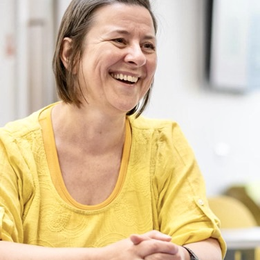Day 1
Registration opens
In-person participants will be able to register at the reception of the Blavatnik School of Government and enjoy tea, coffee and pastries with other in-person attendees and speakers.
Welcome to the Social Outcomes Conference 2023
The Government Outcomes Lab's leadership team will welcome online and in-person participants to this year's conference.

Dr Mara Airoldi
University of Oxford

Andreea Anastasiu
University of Oxford

Dr Eleanor Carter
University of Oxford
Understanding the ‘eleven secret herbs and spices’ - how do we improve effectiveness in multi-agent public services?
Professor Mark Considine is Professor of Political Science at the University of Melbourne. He is one of Australia’s most respected political scientists, with a career spanning both academic research and applied policy work for government and civil society organisations. In his keynote address, Professor Considine will draw on his award-winning research on public sector reform, new methods of governance and the street-level delivery of public programmes, to share reflections on the challenges facing public-private models of service delivery and the key pathways for addressing these issues. He will explain why, to improve multi-agent public services, it is important to re-think regulatory relations, strengthen knowledge networks among agenda, and engaging service users in problem-solving.
Panel discussion
The keynote will be followed by a response panel discussion with leading academics and practitioners.
Find a recording of the event here.

Professor Mark Considine
University of Melbourne

Aman Johal
BSC

Ben Jupp
NHS England

Dr Joe Abah
DAI Global

Prof Ole Helby Petersen
Roskilde University

Dr Eleanor Carter
University of Oxford
Chair
Deep dive 1.1 Comparative perspectives on building sustainable ecosystems for social outcomes contracting
In this session we will take stock of efforts in different social, economic, and political contexts around the word to develop or strengthen system-level conditions for the development of social outcomes contracts. We will look at the experience of countries as diverse as Colombia, India, the Netherlands, the UK and Japan. We will ask: what are the structural barriers limiting the adoption of outcomes-based contracting in the provision of public services? What can we learn from the experience so far? How can we move from pilot to ecosystem when it comes to social outcomes contracting.
Find a recording of the event here.

Dr Chih Hoong Sin
Independent
Chair
Presentations
The increasing adoption of outcomes-based solutions (especially where more appropriate and effective than traditional input-based spending) is probably the single greatest evolutionary step that governments need to take to foster …

Raffaella De Felice
GSG Impact
Not another pilot
The Dutch landscape
The Netherlands has gone through a social outcomes contracting cycle that resembles a number of other countries. In the first stage of the cycle, …

Ruben Koekoek
Social Finance NL
Although social Impact Bonds (SIBs) were promised to attract private capital to tackle complex social problems, it is not clear the extent to which such projects can be employed in …

Dr Fernando Domingos
Sao Paulo School of Business Administration
The presentation will focus on the theme of the government's role as an outcome funder in creating social value, in the context of a low-middle income country. Drawing on experiences …

Samar Bajaj
Michael & Susan Dell Foundation
The central government and local government entities in Japan need to address its incrementally complex social issues, with limited resources in the age of a declining birthrate and ageing population. …

Kanu Maeda
PFS promotion office, Cabinet Office, Japan
With state budgets being stretched from many angles by multiple COVID-19 measures, climate, energy and conflict crises, public funding of preventive and entrepreneurial interventions is under enormous pressure and innovative …

Ian Dewae
HOGENT, University of Applied Science Ghent. Research Center for Sustainable Organization
SIBs.CO, the Social Impact Bond program in Colombia, has been a catalyst for a disruptive change in the country by promoting relational changes that foster public-private social partnerships to solve …

Maria Paulina Gómez
Fundación Corona
Deep dive 1.2 Procuring outcomes - still knotty?
Outcomes can be knotty for public procurement, but are we learning to untangle ourselves? Procuring social services on an outcomes basis is different for procurement, legal, and contract management professionals more accustomed to buying activities or short term outputs. This session explores practical approaches to the opportunities and challenges of outcomes-based contracts from these professionals' perspectives. (See also last year's SOC22 Deep Dive 2.1 session, Outcomes are knotty for public procurement here.)
Find a recording of the event here.

Dr Ruairi Macdonald
Faculty of Law, University of Oxford

Professor Anne Davies
Oxford Law Faculty
Chair
Presentations
Project Overview:
Public procurement is the process by which government departments purchase goods and services from the private sector. Proactive deployment of £300+ billion UK public sector spending to help …

Prof Simon Collinson
City-REDI & WMREDI, Birmingham Business School
Governments spend billions of dollars annually on social infrastructure but are social indicators changing as a result? What outcomes are these projects targeting and are they delivering?
Australia’s first Outcomes-Based …
International public procurement warrants greater collaboration to attain favorable outcomes, yet the differences in legal systems, cultural contexts, and nationalist homophily present significant challenges to cross-border collaboration. This paper presents …

Maria Lungu
Florida Atlantic University
This session will focus on the key findings of a new book about the ‘social enterprise difference’ in public services.
The book investigates how relational partnerships between public authorities and …

Jonathan Bland
E3M

Julian Blake
Stone King

Jamie Veitch
E3M
This paper comprises recommendations and guidelines to build an ESG oversight framework leveraging the existing European Union's compliance framework and adopting innovative approaches to harmonise how public procurement and investments …

André Quadra
Sciences Po

Fabiola Conti
Sciences Po
Since 2014, the State of Israel has been working on improving the way outsourced social services are provided. An outsourced social service is an educational, medical, or caretaking service provided …

Shira Tzachor
JDC Israel

Yehonatan Almog
PMO, Israel
The presentation will focus on the theme of the government's role as an outcome funder in creating social value, in the context of a low-middle income country. Drawing on experiences …

Mohit Bahri
GDi Partners

Madhunika Iyer
GDi Partners
Deep dive 1.3 Participatory approaches in research, services and policy
Public policy and management have seen a push for re-focusing on the involvement of service users and community groups in the design and implementation of services and policies in recent years. The underpinning notion is to mitigate structural power imbalances by giving a voice to the people most affected. This shall enhance the user-centredness of the service/policy and improve its social outcomes.
Looking at international and national case studies, the focus of this session is three-fold:
- Exploring participatory research practice with marginalised groups
- Examining participatory approaches in service commissioning and implementation
- Investigating knowledge transfer and learning between frontline organisations and policy-makers
Find a recording of the event here.
Presentations
Refugees face significant barriers when it comes to being included in research projects, being recognised as experts, and being included in programme decision-making. While researchers and organisations have increased efforts …

Mohamed Hassan
Refugee Studies Centre, University of Oxford
Social Innovation (SI) can offer frameworks for deploying anti-racist practices and applying equitable processes and outcomes. This article will introduce readers to SI literature and discuss how these models can …

Prof. Gary Painter
University of Cincinnati
Bridges Outcome Partnerships Go Lab Submission: Harnessing the power of lived experience to create opportunities for “Disrupting Voices” to act as a catalyst for change.
Kirklees Better Outcomes Partnership (KBOP) …

Victoria Busby
Kirklees Better Outcomes Partnership

Michael Peoples
Kirklees Better Outcomes Partnership
At Fundación Luksic, we believe that the role of intermediation between State policies and end users in Chile has been systematically underestimated. As policymakers aim to respond to society’s grand …

Macarena Cea Martinez
Fundación Luksic
SUIT was developed as a concept in 2007 to offer a voice to people who accessed drug treatment interventions in Wolverhampton, West Midlands, UK. Upon learning from the experiences of …

Sunny Dhadley FRSA
SUIT
Historically, individual and institutional private philanthropy has suffered from criticism of self-interest, elitism and furthering plutocracy. Community foundation philanthropy focuses on place-based philanthropy as well as advancing community well-being often …

Dr Patsy Kraeger
Chatham University
Deep dive 1.4 Public sector reform: insights from the Life Chances Fund & beyond
The last year in the UK has seen an unprecedented level of strain on the public sector. With the legacy of the pandemic, the cost-of-living-crisis, and crippling strikes frequently making headlines, public sector reform is needed more than ever.
This session will draw on the Life Chances Fund* (LCF) & beyond for effective, real-life project-level learnings about what works alongside a rich set of insights that speak to wider public sector provision challenges. We will bring together the policy journey around the LCF with insights generated through the evaluation work, to explore how the evidence coming out of the LCF can inform public sector reform efforts.
In particular, we will explore:
- How LCF offers an interesting model for local-central collaboration, that enable effective local delivery systems and multi-agency working
- The role of outcomes funds such as the LCF in enabling a greater focus on prevention in the provision of public services
- How a focus on outcomes can enable more person-centred approaches
* The Life Chances Fund (LCF) is a pioneering £70m programme, launched by the UK Government in 2016. It supports 29 locally-commissioned impact bonds focussed on supporting vulnerable individuals, and it is underpinned by an ambitious and innovative data and evaluation agenda.
Find a recording of the event here.

Aman Johal
BSC

James Magowan
CSY Directorate, DCMS (UK)

Val Keen
UK Government

Kathy Hall
University of Oxford
Chair
Presentations
Social Impact Bonds (SIBs) are outcome-based contracts that were promised to attract private funding from social investors for pressing social issues. By drawing from a longitudinal survey employed with stakeholders …

Dr Eleanor Carter
University of Oxford
Best practice in delivering Social Impact Bonds (SIBs); system-change learning, capabilities and coproduction.
Central question, main issues analysed: Various commentators have seen Social Impact Bonds (SIBs) as implementing practices associated …

Lee Whitehead
Manchester Metropolitan University
Deep dive 1.5 The greatest goals — procuring sustainability at the edge of our ability?
Facing severe social and environmental challenges, we demand great things from our public procurement systems. Increasingly, social and environmental outcomes are pursued through government contracts at all levels of government. This session will explore practical opportunities and challenges of implementing wider policy goals through contracts, including recent experiences of procurement professionals working to mitigate climate change.
Find a recording of the event here.

Dr Ruairi Macdonald
Faculty of Law, University of Oxford

Professor Jane Lynch
Cardiff University
Chair
Presentations
Public contracts have an essential role to play in avoiding catastrophic climate change. The procurement activities of national, state and local governments are estimated to be directly or indirectly responsible …

Abby Semple
Public Procurement Analysis
Central question and main issue analysed in the paper: This paper considers regional public procurement practices in England, and the interface between local government and other regional/national stakeholders. Our starting …

Steven Parker
Open University Business School

Joyce Liddle
Northumbria University
Social value in public procurement is moving inexorably forward, yet there are still gaps in policy, practice, and theory, on how to measure social impact and critically, over what time …

Prof Jo Meehan
University of Liverpool Management School

Prof Thomas Hale
BSG, University of Oxford

Prof Davide Vannoni
University of Turin

Ian Morris
Peterlee Town Council

Danielle Pettigrew
Scotland Excel,
This presentation is based on the article ‘Accountability for "social value" in procurement’ by A.C.L. Davies, Elinor Buys and James Ruairi Macdonald, published in [2023] Public Law 214. We examine …

Professor Anne Davies
Oxford Law Faculty
Deep dive 1.6 Navigating collaborative governance – strategies, dynamics and impact
Collaborative governance between public and private sector stakeholders has emerged as a central tool to respond to complex societal problems. This panel will delve into key aspects of this evolving field. Panellists will discuss how collaborative governance can drive innovation, foster trust and enhance decision-making for better outcomes in public service provision. It will also highlight the approach’s challenges around organisational differences and values, power imbalances, and high transactions costs. The panel will explore strategies for implementing collaborative governance mechanisms, as well as the dynamics and impact of such an approach through a set of underlying questions:
- Leadership: What is the role and which capabilities do individual leaders need to have to reconcile the different interests in the collaborative network?
- Coping strategies: Which strategies do stakeholders apply to cope with the challenges of co-creation?
- Budget allocation: How are budgets allocated for collaborative governance?
- Hybridity: How do the different governance modes, underpinning the collaborative network, evolve over time?
- Trust & relational processes: If and how does an outcomes-based partnership facilitate trust-building across its multiple stakeholders?
Find a recording of the event here.

Professor David Van Slyke
Maxwell School of Citizenship and Public Affairs, Syracuse University
Chair
Presentations
As part of a social investment project to transform the social services in the City of Stockholm, an outcome-focused partnership, a Social Outcomes Contract (SOC), was commissioned with five charities. …

Tomas Bokström
RISE Research Institute of Sweden
Public budgeting allocation processes offer stakeholders a set of mechanisms for determining how the resources of government should be divided and distributed among various policy, organization, and/or program priorities. Collaborative …

Dr Brian Ohl
Maxwell School, Syracuse University
Co-creation is seen by scholars and practitioners as an enticing way to enhance the quality and legitimacy of public decisions and services, especially at the local level. However, whereas stakeholder …
The UK public sector increasingly seeks to deliver operational impact through a broad range of multi-stakeholder partnerships (MSPs), delivered and evolved through collaborative transformation. The leadership of collaborative transformation is …

Guy Neale
PA Consulting
This article investigates new governance arrangements in the public sector to finance projects with social and/or ecological impacts, called Social Impact Bonds (SIBs, Fraser et al., 2018). Those arrangements are …

Vincenzo Buffa
University of Angers
Deep dive 1.7 Pursuing better social outcomes in fragile and conflict-affected states
Fragile and conflict-affected states often lack consistent public service provision, and struggle to respond to the needs of their populations. Support from external organisations is therefore common, in the form of financial aid, service delivery, and/or administration. What makes for an effective partnership in contexts that are by definition high-risk and subject to instability? This session seeks answers to this question, drawing from case examples of cross-sector, multi-scale, service partnerships in fragile settings.
Key themes include:
- Managing risk and building resilience in the face of instability
- The relationship between external and domestic actors
- Accountability and legitimacy
- Sustainable exit and transition at the end of a programme
Find a recording of the event here.

Louise Savell
Social Finance

Dr Harry Bregazzi
University of Oxford
Chair
Presentations
Background: In many contexts, including fragile settings like Afghanistan, the coverage of basic health services is low. To address these challenges there has been considerable interest in working with NGOs …

Diwa Samad
The Global Fund
CONTEXT & OVERVIEW
Since 1985, the International Federation of Red Cross and Red Crescent Societies (IFRC) has supported more than 210 million people through its Disaster Response Emergency Fund (DREF) …

Simon Meldrum
IFRC
Finance for Jobs Consulting Services (F4J-CS) is tasked with implementing the Finance for Jobs (F4J) Development Impact Bond (DIB), aiming to help unemployed Palestinian youth find sustainable jobs. The DIB …

Jalil Hazboun
Finance for Jobs Consulting Services
Firming up the handshake: exploring the potential of formal relational contracting in the public sector
There is widespread acknowledgement that the current transactional approach to Public Private Partnerships in delivering public services isn’t working. Policymakers and practitioners regularly emphasise the need for more cooperative, productive relationships between stakeholders. Relational contracts have been shown to foster successful partnership working in private sector contracting, but what about their potential in complex public-private settings?
In this session, we will draw on the latest insights from research, policy and practice to explore how a formal relational approach to public-private partnerships seeking to resolve complex social problems might prove more fruitful. We will begin by hearing the latest insights from a forthcoming book, which examines the lessons we can learn from two contrasting case studies in the UK and US. We will then turn to an expert panel of academics, practitioners and policymakers to explore the broader benefits and challenges that may arise in trying to adopt such an approach to public contracting.
Find a recording of the event here.

Michael Gibson
University of Oxford

Dr Eleanor Carter
University of Oxford

Professor Carolyn Heinrich
Vanderbilt University

Maria-Laura Crespo
Ministry of Social Development, New Zealand

Tim Cummins
World Commerce and Contracting

Dr Fareed Abdullah
South African Medical Research Council

Professor David Van Slyke
Maxwell School of Citizenship and Public Affairs, Syracuse University

James Magowan
CSY Directorate, DCMS (UK)

Liam Sloan
Public Digital

Dr Felix-Anselm van Lier
University of Oxford
Chair
Book Launch: Social Economy Science - transforming the economy and making society more resilient
We will mark the publishing of Social Economy Science by Oxford University Press. Edited by Gorgi Krlev, Dominika Wruk, Giulio Pasi, and Marika Bernhard, the book brings together cutting-edge research on a suite of important questions such as: How can social entrepreneurship and social innovation play an essential role in addressing persistent societal problems, including the challenge of creating more democratic, equitable and participatory forms of organising? How can impact investing and social outcomes contracting by governments change the ways in which we think about funding the common good? The book includes contributions from leading scholars and practitioners in the field, including Geoff Mulgan, Julie Battilana, Mario Calderini, and GO Lab’s own Eleanor Carter.
Lack of progress on global sustainable development and difficulties in managing crises effectively underpin the need to transform the economy and find new ways of making society more resilient. The social economy is increasingly recognised as a driver of such transformations. It comprises traditional forms of cooperative or solidarity-based organisations as well as new phenomena such as impact investing or social-tech ventures that aim to contribute to the public good. Social Economy Science provides the first comprehensive analysis of why and how social economy organisations create superior value for society. The book draws on organisational theory and transition studies to provide a systemic perspective on complex multi-stakeholder forms of action. It discusses the social economy’s role in promoting innovation for impact, its role as an agent of societal change, and as a partner to businesses, governments and citizens.
This session is hosted in partnership with Kellogg College, University of Oxford.
Find a recording of the event here.

Dr Mara Airoldi
University of Oxford

Bayo Adelaja
Do it Now Now

Dr Gorgi Krlev
ESCP Business School

Dr Eleanor Carter
University of Oxford

Mario Calderini
Politecnico di Milano School of Management
Chair
Networking dinner
Enter access code
Submit the event access code to reveal the session/meeting credentials.
